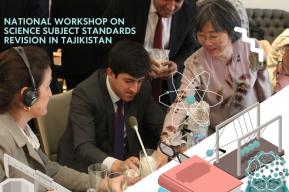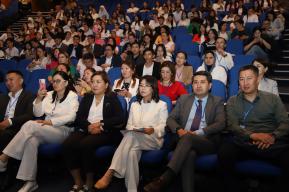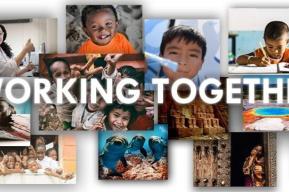Article
Improving Education Through Curriculum Transformation in Haiti
Authors: Amapola Alama, Béatrice Malebranche, Julie Couzinet
Since 2022, the Haitian Ministry of National Education and Professional Development (MENFP), supported by the International Bureau of Education of UNESCO (UNESCO-IBE) and the Inter-American Development Bank (IDB), has embarked on a large-scale transformation of Haiti’s education. After an initial phase focused on diagnosing the system’s challenges and building capacity, the MENFP is now poised to enact a comprehensive Roadmap for curriculum transformation in Haiti —a product of a collective effort involving all stakeholders.
The primary goal is to reshape the system and empower its participants to deliver quality, inclusive education in Haiti.
Transforming the Curriculum in Haiti For More Quality and Relevance
Despite a significant 50-year increase in access to education in Haiti, with a net enrollment rate of 90% for children, various reports and studies still depict Haiti’s education system as inefficient. Based on at least two assessment methods, academic results reveal a high failure rate and a lack of mastery of fundamental learning, particularly in reading skills. The primary school completion rate hovers around 50%, and pedagogical, managerial, and environmental challenges persist. This is exacerbated by the instability caused by recurrent natural disasters and a chronic socio-political crisis that has greatly weakened the purchasing power of families. At the same time, 80% of the system remains privately driven.
For the MENFP, a key objective in the coming years is to enhance the quality and relevance of education in Haiti, preparing learners and society for current and future challenges. This commitment reaffirms Haiti’s dedication to quality education, dating back to the 1982 Bernard Reform Implementation Act and the “12 Measures” introduced in 2014.
The MENFP has declared the curriculum a top priority in Haiti’s education reform. UNESCO-IBE considers it the most critical component of the education system, its driving force. The definition of curriculum used here goes beyond educational programs to encompass several other components and elements of the education system in a systemic approach, from the guiding documents laying out the vision for education to the evaluation practices and including all levels in between – school and training programs, pedagogical materials and manuals, inspectors, pedagogical advisers and trainers’ material and practices as well as teacher practices in the classroom.
The curriculum is, therefore, composed of all documents that clarify the how, when, where, and why children should learn throughout their school life. It also comprises all the actors in charge of their design, implementation, and evaluation.
A 2023 study on the state of the curriculum unveiled substantial efforts made by the MENFP to clarify Haiti’s vision. The Curriculum Orientation Framework (COF), finalized in the same year, offers a detailed picture of a coherent and relevant curriculum, incorporating local and endogenous knowledge while aligning with global educational trends. It clarifies for all actors of the system the competencies that learners should develop and the knowledge to acquire, as well as the pedagogical orientations and practices teachers should implement in their classrooms at all levels of learning. Rooted in Haiti’s reality and future vision, the COF is a robust guide for the transformative journey ahead.
A Roadmap to Curriculum Transformation in Haiti: Mapping the Work Ahead
A Systemic Approach to Transforming Haiti’s Curriculum: For Maximized Impact on the System
To ensure a coherent, relevant, and high-quality curriculum, alignment of work and efforts across all MENFP entities with the COF’s objectives is crucial. Recognizing this, the MENFP, with the IDB and UNESCO-IBE support, crafted a roadmap for curriculum transformation in Haiti, which was validated in December 2023. The ambition is to work from pre-primary to secondary education (general and technical), including non-formal education, and involve all relevant system actors, from program developers to teacher trainers, inspectors, heads of schools, and teachers.
This systemic approach requires all actors in the education system to share a common understanding of and align on the COF’s vision, emphasizing collaboration at all steps of the curriculum’s planning, implementation, and evaluation.
Aligning all curricular documents and practices – school programs, teacher training programs, textbooks, and pedagogical tools, pedagogical tools, teacher trainers, and teacher teaching and evaluation practices – is one of the main challenges highlighted by the state of the curriculum study.
The MENFP and partners aim to give life to the COF objectives, such as integrating competency development and Creole in teaching and transversal issues such as – gender, environment, climate change, health, nutrition, and diversity, at every stage of the transformation process.

Anchored in the Curriculum Orientation Framework, the Roadmap aims at:
- Structuring and implementing quality pre-primary education.
- Harmonizing the three cycles of the fundamental level.
- Ensuring implementation of general and technical secondary levels.
- (Re)structuring, strengthening, and equipping the non-formal education sector.
The first and crucial phase will create the conditions that are deemed essential for a systemic transformation to take place. Practically, this means:
- Setting up a specific commission to implement, monitor, and assess the implementation of the transformation. Officialized at the end of 2023, the commission will be the space for a fluid dialogue and collaboration across all entities and directions of the ministry. It will be supported by a secretary who will enable its decisions and thematic commissions to work on each aspect of the transformation under its supervision.
- Creating a cooperation framework for external partners in education and ensuring that their interventions align with the MENFP and Haiti’s educational vision.
- Developing standards and guidance to support translating the COF vision and orientations about using Creole, the pedagogical model, the school environment, gender, and inclusion into reality. These standards will provide a clear base for curriculum actors to refer to throughout the curriculum’s development and implementation.
Contextualizing the Curriculum Transformation For a Haitian Education
The transformation pursued by the MENFP and partners seeks more than systemic efficiency—it aspires to embody Haiti’s vision for education, learners, and society. The MENFP and its partners advocate through this reform for the development and implementation of what UNESCO-IBE defines as an “endogenous curriculum”:
- First, the curriculum should reflect the past, present, and future of the country it is implemented in, in its social, economic, cultural, and religious dimensions, and open up to its regional and global environments.
- Second, it aims to involve all relevant actors within and outside the education system, including actors in designing, implementing, and evaluating the curriculum and civil society, such as parents, communities, and representatives.
The curriculum transformation in Haiti aims to strengthen the social fabric and promote reconciliation, intercultural understanding, and active citizenship, all essential for reuniting a divided and traumatized society.
The COF strives to mold learners into responsible, creative citizens actively participating in Haiti’s societal improvement. Addressing Haiti’s vulnerability to natural disasters, the curriculum should also incorporate a robust risk and disaster management component to foster individual and community resilience, thereby contributing to the security and well-being of the Haitian population.
Finally, by actively involving local stakeholders, including teachers, parents, and experts, the endogenous curriculum will foster an inclusive and collaborative process to shape an authentically Haitian education while being open to the world.
The MENFP insists that achieving these goals requires a clear recontextualization of the curriculum based on Haiti’s needs. While the need for reform is acknowledged nationally, the ongoing reform, initiated in 2022, aims to build a consensus on integrating Creole at various levels and across sectors. Using Creole as a first language in the education system while helping guarantee children’s right to learn and supporting national cohesion and curriculum cultural relevance, MENFP advocates can only considerably improve learning results.
The MENFP and its partners understand that the curriculum should continue to evolve and adapt to new realities. This transformation process is, therefore, not an end but a beginning. Over the next five years, the MENFP and its partners will lay the groundwork for a profound reshaping of Haiti’s education to prepare learners to be active citizens in a fast and ever-changing world so that they can contribute effectively and durably to positive change in Haitian society.
Learn more about curriculum transformation in Haiti and the region in our blog post, Education in Focus. Check the latest content to stay up-to-date with Latin America and the Caribbean education!
Amapola Alama
Amapola Alama is currently Head of Technical Assistance to Member States at the International Bureau of Education of UNESCO IBE with a background in international education and cooperation. She has 30 years of experience in supporting education ministries in their reform processes across more than 40 countries. Previously, she worked as Head of the Education sector in the Spanish development Agency in Morocco and as programme director at the Organization of Ibero-American States for Education, Science and Culture.
Béatrice Malebranche
Béatrice Malebranche, is an Education Specialist with a background in psychology and education, has more than 20 years’ experience in developing education projects in Haiti. Currently, she works as a Project Manager at UNESCO-IBE, where she helps member states with curriculum-related issues.
Julie Couzinet
Julie Couzinet is a Program Assistant at UNESCO-IBE, in the Unit for Technical Assistance to Member States in curriculum-related issues. She previously worked in the non-formal and technical and vocational education sectors in Lebanon with a background in curriculum engineering and political sciences.
This article was initially published in Enfoque Education, the education blog of the Inter-American Development Bank.









